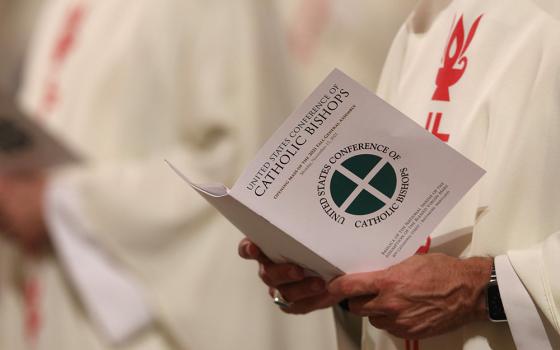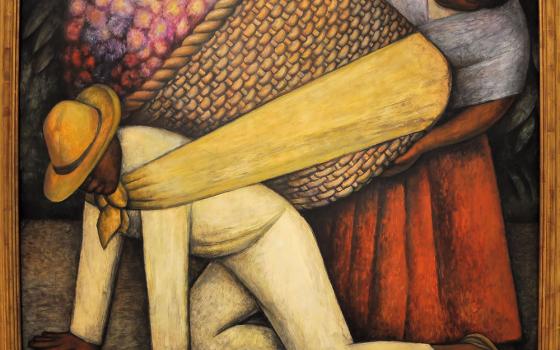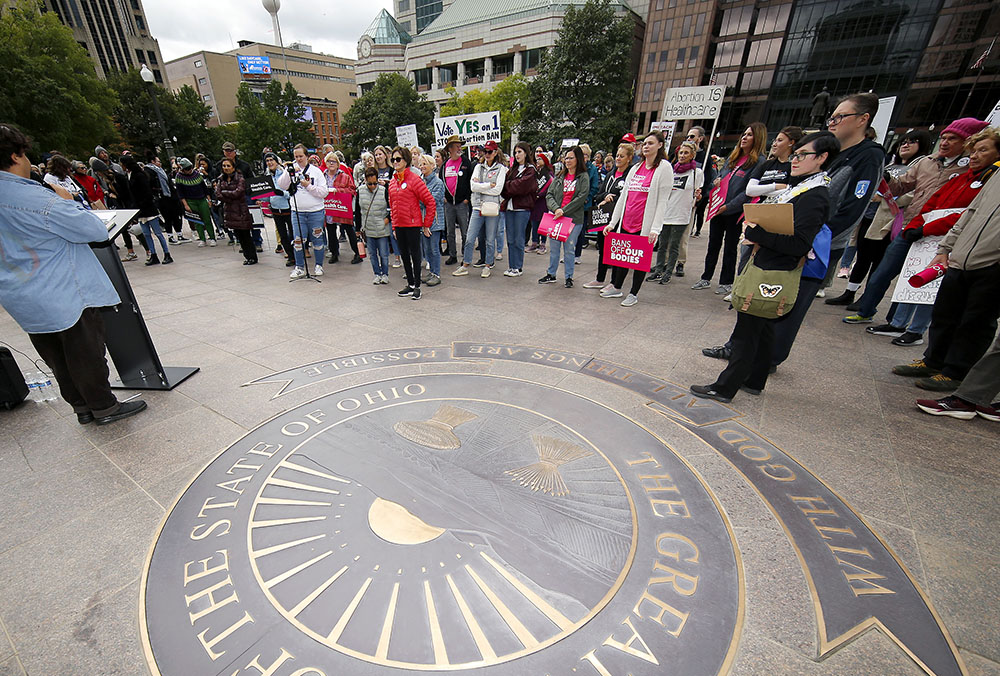
Supporters of Issue 1, the Right to Reproductive Freedom amendment, attend a rally held by Ohioans United for Reproductive Rights at the Ohio Statehouse in Columbus Oct. 8. (AP/Joe Maiorana)
Despite the fact that Roe v. Wade was overturned last year, the bishops in the United States still appear to be fixated on abortion, having declared, at their general assembly on Nov. 15, that it remains their top priority.
While it is frustrating to see the bishops still stuck in this ideological rut, it is unsurprising. With Roe out of the way, the battle over reproductive choice has now moved to the states, and clearly the bishops intend to focus their attention there, rather than concerning themselves with any of the dire challenges families in the U.S. are currently experiencing.
I reside in Ohio, where voters recently approved a constitutional amendment protecting access to reproductive health care, including abortion. Though the ballot measure passed with a significant majority, it was hotly contested across the state, with many religious leaders, Catholics included, vocally asserting that a no vote was the only moral option.
The Cincinnati Archdiocese website called on voters to oppose a "radical constitutional amendment" that "threatens the health and safety of women, the rights of parents and the lives of children across Ohio."
Nine Ohio bishops put out a joint statement declaring, "Today is a tragic day for women, children and families in Ohio. We mourn that the dignity of human life remains concealed by the duplicity of a culture of death."
When I see these and other responses to news about abortion, it strikes me that the bishops and other pro-life leaders, for all their fixation on abortion, haven't bothered to learn much about it. Rather than putting work into listening to those on the frontlines of caring for women's health and reproductive care, or studying the complex medical, moral and legal issues around abortion, the bishops and others are just repeating the same vague and inaccurate things they've been saying for decades.
I've been paying attention to the politics around women's reproductive health since I was too young to vote. In the early 1990s, as an undergraduate at one of the most conservative universities in the nation, I was involved in anti-abortion activism, but even then I was critical of the pro-life movement's neglect of other life issues and its allegiance with right-wing politicians.
Since then, I have seen multiple shifts in rhetoric and approach. I remember when the militant methods of groups like Operation Rescue gave way to slogans like "pro-woman, pro-life" and "love them both." Chaining oneself outside women's health clinics was out, volunteering at a crisis pregnancy center was in. Pro-lifers started to back away from co-opting the language of civil rights activists and talked instead about things like "creating a culture of life."
I changed my views on abortion laws because I am serious about life ethics and the issues around reproductive health.
In 2006, 10 years prior to the election of Trump, the Center for American Progress published a piece by Shira Saperstein called "The Right Way to Reduce Abortion." In her essay, Saperstein argues that reducing the number of abortions per year is an admirable goal, but that making abortion illegal is not the most effective or moral way to do this.
Women, Saperstein points out, will always seek abortions, so removing legal availability will lead to more abortions occurring in unsafe and life-threatening conditions. The only humane way to reduce abortion rates, she writes, is to reduce abortion demand.
While Saperstein's essay was written from a pro-choice position, many of us who had been involved in the anti-abortion movement for years were slowly working toward similar conclusions.
This was partially because some of us began taking time to dialogue with pro-choice feminists instead of slandering and caricaturing them. These feminists were out working for things like an end to rape culture, racial injustice, child poverty and gun violence.
Advertisement
Meanwhile, political and social leaders who identified as pro-life were enthusiastic in their defense of an array of anti-life positions.
So some of us began to dig in deeper, to gain a better understanding of the social issues surrounding abortion. We began to look at factors that correlate with global abortion rates and ask questions about which women are getting abortions, and why. We tried to find data on abortion numbers prior to Roe.
The more we found out about the complex and intersecting issues surrounding this deeply personal and morally serious question, the more wary we became about blanket legislation enacted by those with no medical experience, and a disinclination to listen to women.
Some of us began to listen to Black feminists and activists who pointed us toward reproductive justice as a better way of thinking about the abortion issue.
And some of us arrived, a little late, at the same idea Saperstein puts forth in her essay: that abortion bans are less effective than eliminating the social and medical causes that drive up abortion rates. Unless of course, one is aiming not at a reduction of actual abortions, but tighter restrictions on women's bodies and greater control of our reproductive abilities.
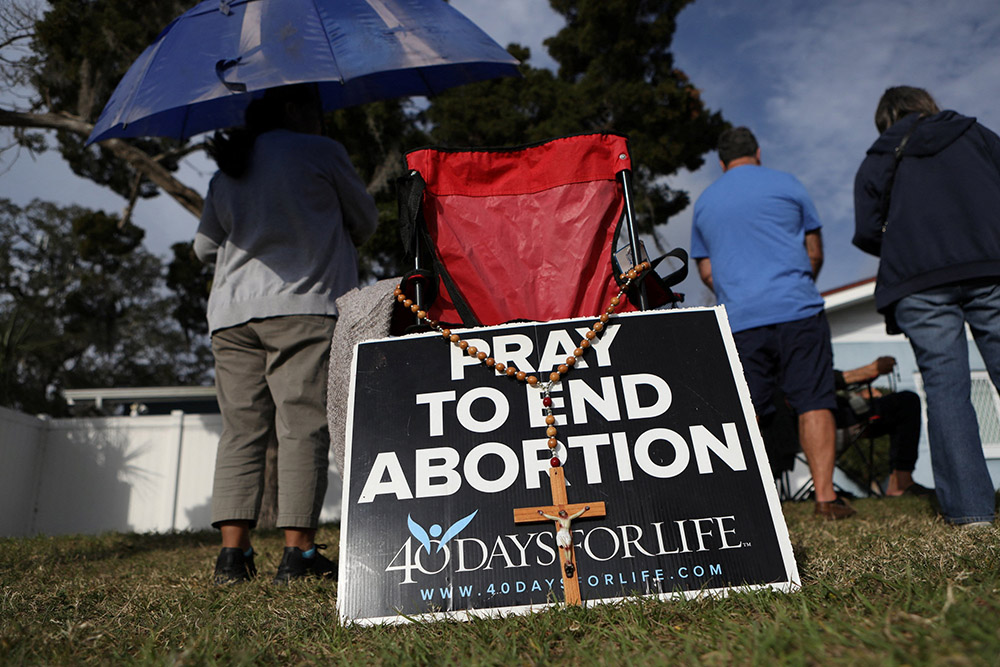
Pro-life activists pray with rosaries Feb. 11 as clients arrive at the Bread and Roses Woman's Health Center, a clinic that provides abortions in Clearwater, Florida. (OSV News/Reuters/Octavio Jones)
The 2016 election and its aftermath merely accelerated a process of questioning and critical analysis that some of us were engaged in already.
More people who had been pro-life for decades began to wonder whether the movement's premises were flawed from the start. It's hard to assert in any seriousness that pro-lifers aren't misogynistic and do care about all lives when millions of people are cheering on an overt racist who has repeatedly promoted anti-life policies and bragged about sexual assault.
It is possible to disagree with pro-choice feminists on some ethical issues while agreeing that the pro-life movement's methods, in terms of both activism and legislation, are contrary to a just society and the common good.
Comparing abortion to human rights issues such as slavery or genocide is both inaccurate and harmful. Marching and shouting slogans is performative, expensive, futile and distressing to women in vulnerable circumstances.
Legislation that makes abortion inaccessible increases the likelihood of women turning to dangerous illegal abortions. It can also lead to women being jailed for miscarriages, or dying due to lack of access to life-saving health care. Pro-life leaders have demonstrated that they are not to be trusted with matters as delicate, complex and personal as women's reproductive health.
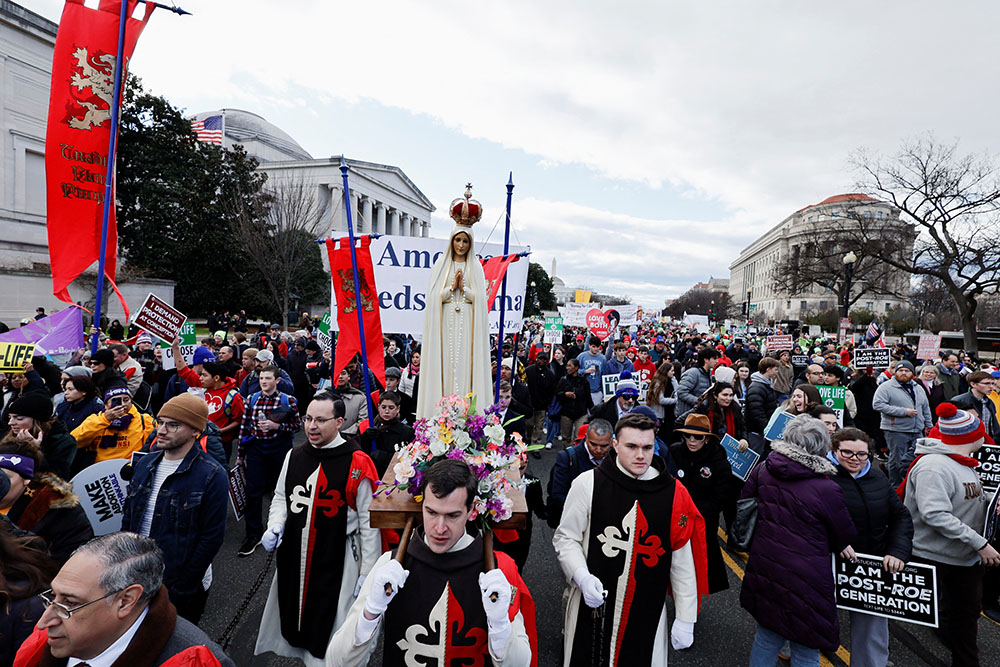
Pro-life demonstrators carry a statue of Mary past the U.S. Supreme Court during the annual March for Life in Washington Jan. 20, 2023. It was the first time the march was held since the high court overturned its 1973 Roe v. Wade abortion decision June 24, 2022. (OSV News/Reuters/Jonathan Ernst)
The learning curve some of us were on took us to a place of greater empathy, as well as a clearer understanding of abortion politics. But apparently not everyone wanted to travel that learning curve.
Today, despite the fact that Roe v. Wade is no more, the militant approaches, inflammatory rhetoric and appropriation of abolitionist language are back. Conservative promises about expanding health care and safety nets once Roe was overturned have proven empty. Anti-abortion activists, including some who once identified as progressive, are adapting the Operation Rescue tactics again, with zero consideration for the effect their performative antics might have on women in stressful and vulnerable situations.
And bishops continue to use alarmist language about abortion, while making the usual empty promises about "supporting women in need" and "helping families flourish."
It's easy to place the blame for some of this on the MAGA movement bringing out the worst in pro-lifers. But it's not just Trump and Trumpism that are at fault. Plenty of people who remain critical of the current trends of the Republican Party continue to repeat incendiary rhetoric and spread inaccurate information about reproductive issues, despite ample opportunities to adopt a more ethical and fact-based approach.
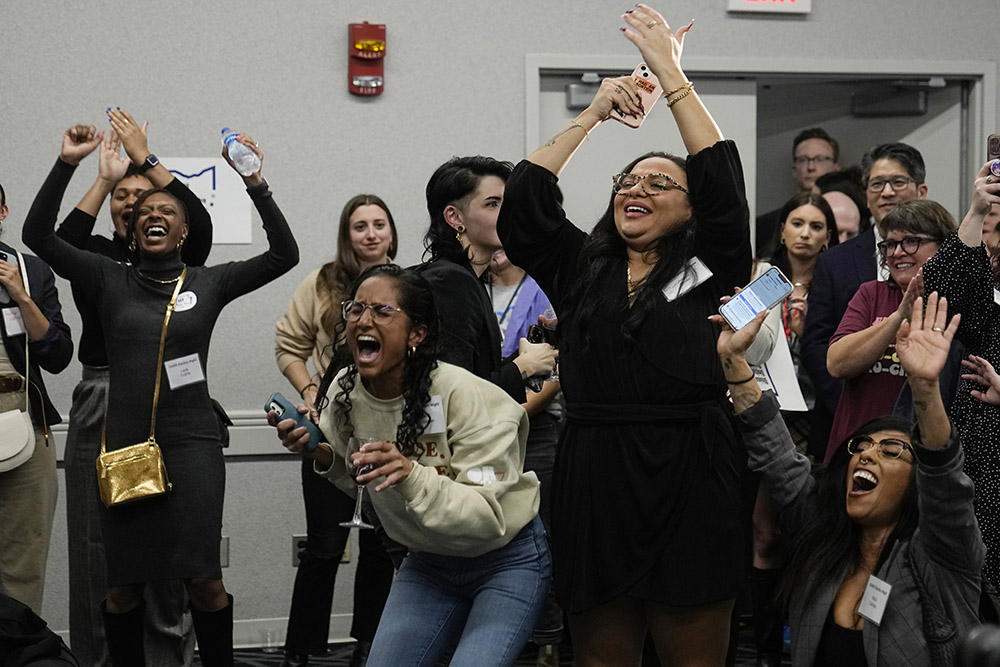
Issue 1 supporters celebrate as Rhiannon Carnes, executive director of the Ohio Women's Alliance, speaks at an election watch party Nov. 7 in Columbus. Ohio voters approved a constitutional amendment that guarantees the right to abortion and other forms of reproductive health care. (AP/Sue Ogrocki)
I changed my views on abortion laws because I am serious about life ethics and the issues around reproductive health. If, as the U.S. bishops claim, abortion really is the preeminent moral priority moving into the 2024 election, one would expect that they, too, would try to take it seriously. One would expect that they would try to acquire accurate knowledge about the social, economic, domestic and medical challenges women face, and study the best ways to ease those challenges.
If the U.S. bishops are serious about addressing abortion, they should look at what works in nations where abortion rates are low.
They would see that attempts to stop abortion by banning it are both ineffective and harmful. They would demand universal health care and living wages for all workers, as well as paid parental leave and affordable child care. They would listen to community organizers and try to support their work.
When I hear the tired platitudes of various religious leaders and look at the performative antics of anti-abortion protesters who are still collecting fetal remains illegally, still chaining themselves to the doors of clinics, I have to wonder how these people have remained fixated on abortion while bothering to learn nothing accurate about it.
And I have to ask: Is it abortion they are concerned about? Or are the pro-choice critics accurate, and is this just about trying to control women?


